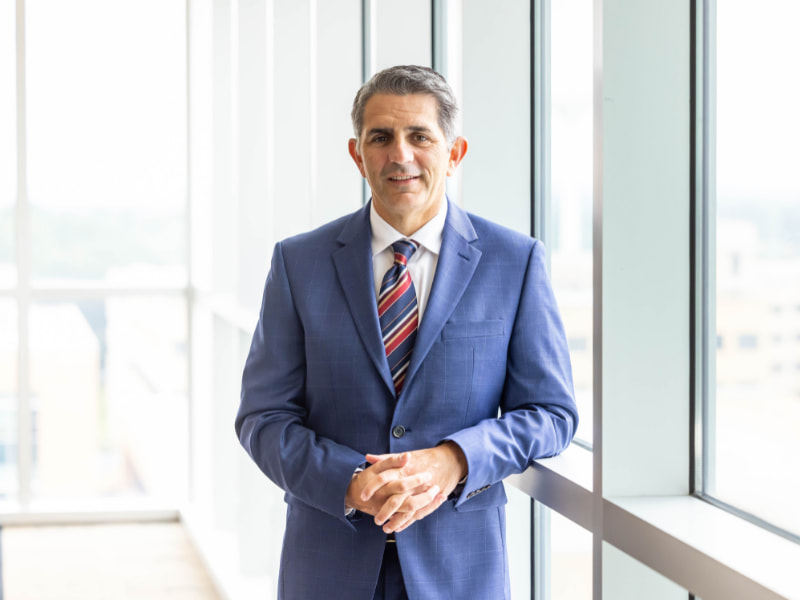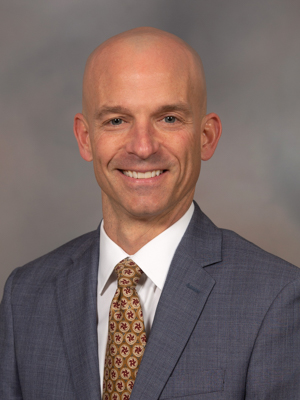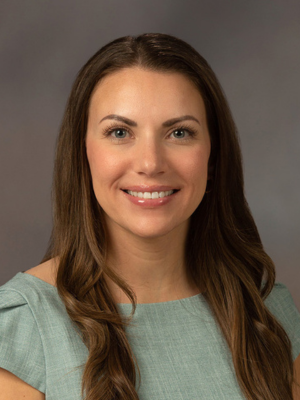Dr. Rodney Rocconi: Ole Miss alumnus returns home to lead call to arms to improve cancer care

The epic fight against cancer is personal for Dr. Rodney Rocconi, director of the UMMC Cancer Center and Research Institute.
His deep-rooted passion for joining the universal battle against the destructive disease stems from one of his earliest childhood memories. He knew from that moment forward that he wanted to become a physician.
“My first glimpse of cancer was when my aunt, who was the youngest of five siblings, died of leukemia at a young age. She was like my third parent.” said Rocconi. “I vividly remember going to the hospital and seeing her on her death bed. I wanted to make any impact to raise the level of cancer care and to give back to an area I truly care about.”
The mission began for the Mississippi Delta native. The proud University of Mississippi alumnus received his degree in biological sciences in 1994. He would soon earn his medical degree from the University of Alabama at Birmingham, where he also completed his residency in obstetrics and gynecology, as well as a fellowship in gynecologic oncology.
For the next 16 years, Rocconi worked diligently in various leadership capacities at the University of South Alabama Mitchell Cancer Institute in Mobile, Alabama. These leadership appointments included chief of gynecologic oncology, associate director of clinical trials, Elsie Cole Chair of Oncology Research and interim director of the Mitchell Cancer Institute.
“The interim director position at the institute taught me a lot, like things I should pursue and do, and what not to do,” said Rocconi. “So, when this (director position with the CCRI) opportunity presented itself, in my hometown’s back yard, it made perfect sense.”
He also performed dual roles in a partnership between the University at Alabama at Birmingham and Infirmary Cancer Care in Mobile, Alabama. He was named the associate director of ICC, director of research at ICC and professor of gynecologic oncology at UAB. Here, he also served as senior scientist for the Center for Clinical & Translational Science and Center for Women’s Reproductive Health.
Rocconi’s knowledge and expertise should serve the Medical Center well in future endeavors.

“UMMC has an ethical imperative to be the leader in providing cutting-edge cancer clinical care and research to the citizens of Mississippi. We are very pleased to have Dr. Rocconi as the leader of our continued organization and investment in cancer care for the state,” said Dr. Alan Jones, associate vice chancellor for clinical affairs.
When reflecting on his family’s history of cancer and the difficulties they faced, the relationships Rocconi develops with patients become personal. He believes economic, mortality and racial health disparities serve as monumental obstacles for patients, so his research and life’s work focuses on addressing and overcoming these inequalities.
“I come from a family of Italian immigrants, so we settled in the Delta for farming reasons,” said Rocconi. “I have numerous family members who passed away from cancer, so looking back at problems associated with poverty in a rural area, I see there was a lack of resources that could have benefited them.”
As principal investigator, he has led the charge in 70 clinical trials and has published 117 manuscripts centering on the management of cancers of the uterus, cervix, ovary and lower genital tract.
He is also the holder of eight patents involving the detection and treatment of ovarian and endometrial cancers. In essence, the patents focus on activating the immune system to recognize cancer cells as abnormal, which has the potential to generate effective and personalized vaccines for cancer patients.
“Without question, the most effective cancer ‘therapy’ is preventing cancer to begin with. The GYN anatomy is essentially a ‘window into the abdomen.’ As such, we studied the potential of looking at vaginal and cervical proteins as a way to screen for ovarian and endometrial cancers,” said Rocconi. “We performed a large national study of over 400 patients and demonstrated that we can detect early stage ovarian cancer from this test. This resulted in a series of patents around this discovery as well as the formation of a spin-off company to further this work.”
His childhood familial experiences with cancer, coupled with his life’s work in cancer research has come full circle through his position as director for the CCRI. His ultimate vision is to obtain National Cancer Institute designation for the cancer center.
“NCI designation is a heavy lift and a long-term plan, but it is definitely a worthwhile plan, considering our own patients of the state of Mississippi would benefit,” said Rocconi. “Everything we do now, each small decision, must be completed through the lens achieving NCI designation.”
NCI serves as the federal government’s principal organization on cancer training and research. As a federal agency, NCI receives funding from Congress. With a FY 2023 budget of close to $7.3 billion, the agency supports cooperative agreements to facilitate research conducted at hospitals, cancer centers, medical schools and universities across the nation. Currently, the agency supports 71 NCI-Designated Cancer Centers and more than 5,000 grantees.
With a national designation and federal funding, CRRI will be able to advance research in cancer detection, diagnoses and treatment. Most importantly, the enhancements in cancer care will help patients across Mississippi live healthier and longer lives.

“Dr. Rocconi’s extensive experience in both caring for cancer patients and conducting cancer research is laudable in its own regard. His work to eliminate racial health disparities combined with his Mississippi roots, however, truly set him apart,” said Dr. Leslie Musshafen, executive director of research for the Office of the Associate Vice Chancellor for Research, interim administrator for the Cancer Center and Research Institute and assistant professor of preventive medicine. “Dr. Rocconi is ideally positioned to advance the Cancer Center and Research Institute as a national leader in cancer care and discovery and to significantly reduce the cancer burden among Mississippians.”
Rocconi notes it will take strategic planning and key partnerships with community stakeholders to help bring his goal of obtaining national designation for the CCRI to fruition.
“We must build a coalition of community partnerships and raise the level of cancer care through outreach programs,” said Rocconi. “If we create a first-class, NCI designated cancer center, by proxy, it will benefit our patients by improving the cancer care they deserve.”
Above all, he’s determined and devoted to his lifelong vision to bring quality cancer care to groups who face overwhelming health disparities associated with gynecologic cancers. He stresses increasing access to clinical trials will lead to more discoveries, better treatment and ultimately, higher cure and survival rates.
He challenges health care professionals across the state to join his cause.
“Our call to arms in Mississippi is to improve cancer care,” said Rocconi. “We should serve as the model to address cancer, and we should pour every available resource into it.”


